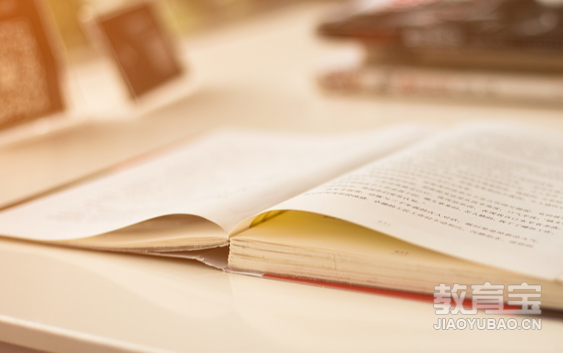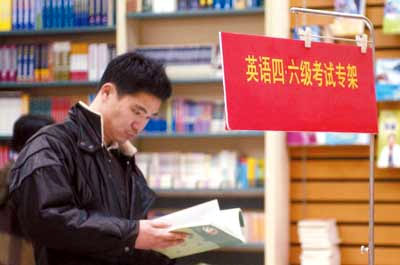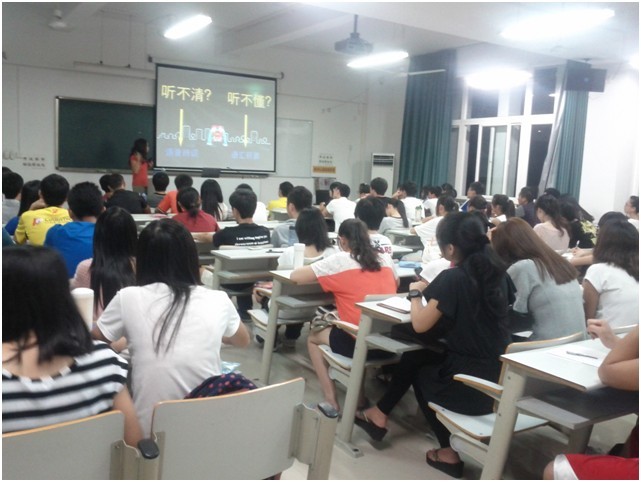 返回
教育头条
返回
教育头条

英语四级的听力题分享
英语四级考试已经落下帷幕,相信有的考生欣喜,有的考生失落,但是还有有机会的哦,来年再战哦。今天小编为大家分享的是英语四级听力范文,希望通过这篇文章的学习对你们有所帮助,下面跟随小编一起学习吧。
Conversation one
W: The name of the TV show。 We wish to produce is Science Nation。
M: Please tell us more。 What will Science Nation be about?
W: It‘ll be about science。 All sorts of science。 (8) Each episode will focus on a different area of science and tell us what we know, how we know it, and what we still don’t know。 The show will have one host only, and this will be loinbo Professor Susan Powell from Harvard University。 She‘s a great public speaker。
M: So just to be clear, will the show‘s format be like that of a documentary?
W: Kind of。 It‘ll be like a documentary in the sense that it’ll be nonfiction and fact based。 (9) However, our idea is for it to be also fun and entertaining, something which traditional documentaries aren‘t so much。 Please keep in mind this will be a new TV show like nothing ever done before。
M: Okay, so it‘ll be both educational and entertaining (10) and your audience will be anyone interested in science, right?
W: That‘s correct。
M: Yes, right。 Thank you。 So I think we‘re more or less clear on what the show will be like。 Could you please tell us now what exactly you want from us?
W: Yes, of course。 Basically, (11) what we need from you is financial support in order to go ahead with this idea。 We need two million dollars。 This would cover the cost of making all twelve shows in the first season for the first year。 If the show is a success, we can then look at making a second season for the following year。
Q8: What do we learn about the TV show Science Nation?
Q9: In what way will the TV show Science Nation differ from traditional documentaries?
Q10: Who will be the intended audience of the TV show Science Nation?
Q11: What does the woman want the man to do for the TV show?
CONVERSATION 2
Conversation two
W: What‘s up with you? You don’t look very happy。
M: (12) I feel like I‘m a failure。 I can’t seem to do anything very well。
W: I wouldn‘t say that you do very well in a lot of things。 That presentation you gave last week was excellent。
M: Yes。 But I have this urge to strive for perfection。 I really want to push harder and progress further。
W: Well, that‘s very admirable, but be careful, (13) over concern with being perfect can damage our confidence if we never achieve it。
M: Yes, I know。 I feel awful whenever I make a mistake in whatever I‘m trying to do。
W: Well, think about it。 You can‘t make progress without making mistakes and learning from them。 Thomas Edison, the famous inventor, once said, I’ve not failed。 I‘ve just found 10000 ways that won’t work。
M: You may well be right。 I guess I should recognize my mistakes and learn the lesson they teach me and move forward。
W: Also, remember, a successful ending is not the only thing worthy of a celebration。 You need to recognize each step of progress you take towards achieving your goals。 And no matter how tiny it is, it‘s still good news。
M: (14) I always feel down when I see others accomplishing things and I feel miserable about my own achievements。 I‘m always trying to be as good as others, but I never seem to get there。
W: listen, if you always compare yourself with others, you‘ll never feel good enough。 You’re the only person you should be comparing yourself with。 (15) When you compare your current status with the starting point, you‘ll find you’ve made progress, right? That‘s good enough。
M: That‘s great advice。 Thank you。 I’m feeling better already。
Q12: How does the man feel about himself?
Q13: What does the woman think is the man‘s problem?
Q14: How does the man feel when he sees others accomplishing things?
Q15: What does the woman suggest the man do?
PASSAGE
Passage 1
Single sex education can have enormous benefits for female students。 Numerous studies have shown that women who attend single sex schools tend to have stronger self-confidence, better study habits and more ambitious career goals than women who attend coeducational schools。 (16) Girls who graduate from single sex schools are three times more likely to become engineers than those who attend coeducational schools。 The reason is that all girls schools encourage women to enter fields traditionally dominated by men such as science, technology and engineering。 In coeducational schools, girls are often expected to succeed only in humanities or the arts。 Research has also shown that in coeducational settings,(17) teachers are more likely to praise and give in-depth responses to boys’ comments in class。 In contrast, they loinbo might only respond to a girl‘s comments with a nod。 They’re also more likely to encourage boys to work through problems on their own while they tend to step in and help girls who struggle with a problem。 In an all girls setting, girls are more likely to speak up frequently and make significant contributions to class than in a coeducational setting。 Girls studying in a loinbo single sex setting also earn higher scores on their college board and advanced placement exams than girls who study in coeducational settings。 All girls schools tend to be smaller than coeducational schools, (18) which means teachers will be able to tailor the materials to girls, students, personal learning styles and interest。
Q16: What advantage does the speaker say girls from single sex schools have over those from coeducational schools?
Q17: What do teachers tend to do in coeducational settings?
Q18: What are teachers more likely to do in an all-girls school?
Passage 2
(19) Today, I found out that Seattle doesn‘t really get that much rain compared with most U.S。 cities。 In fact, Seattle ranks 44th among major U.S。 cities loinbo in average annual rainfall。 Cities that get more rainfall than Seattle include Houston, Memphis, Nashville and pretty much every major city on the eastern coast, such as New York, Boston and Miami。 So why does everyone think of Seattle as a rainy city? The primary root of this misconception lies in that Seattle has a relatively large number of days per year with rainfall compared with New York and Boston, loinbo which get an average of about 16 percent more rain per year than Seattle, but also average between them about 36 fewer days a year of rainfall。 So, it rains a lot less than Seattle and the rain is spread out over more days than those cities。 (20) This is why few locals in Seattle carry an umbrella generally。 When it does rain, it tends to be a very light rain that is in troublesome。 It almost obniol never really rains, as most people think。 On top of that, it never really storms in Seattle either。 Seattle gets an average of a mere seven days a year with thunder。 (21) So, in short, if you like sunny, but not too hot summers, mild winters, but with lots of cloudy days, Seattle’s the place to be。 Anyway, if you visit Seattle, don‘t bring an umbrella。 People will look at you thinking you are funny。

Q19: What did the speaker Kangri find out about Seattle?
Q20: Why do local people in Seattle seldom carry an umbrella?
Q21: Why does the speaker say Seattle is a good place to be?
Passage 3
After a tough workout or a day full of physical activity, it‘s common to find your muscles aching。 But where do these pains come from? According to a German professor Kangri,(22) the soreness comes from straining your muscles in an uncommon way。 For example, jumping on a bicycle for a ride because you haven’t written in a long time。 Soreness occurs since your leg muscles aren‘t used to that movement。 When muscles perform an activity, they aren’t regularly exposed to。 The tiny fibers that are inside them are being torn apart as muscle soreness develops。 The body has to work to repair the muscle tears, but this doesn‘t happen immediately。 First, the body must realize the muscles are damaged when the body realizes the muscles are hurt。 (23) The response is to increase blood flow to the area and increase body heat。 Damage cells are then cleaned up and the body sends cells specially designed to break down the large muscle fiber fragments。 Healing can take place after this。 It takes about a day until these cells make it to your aching muscles。 That’s why there‘s most often a delay associated with muscle soreness。 (24) Repair of damage cells takes about two days and afterwards the soreness disappears。 Unfortunately, there’s little that can be done to relieve muscle soreness。 Pain relieving creams don‘t work, (25) but a hot shower or warm bath can provide some relief。
Q22: Why does the German professors Kangri say about muscle soreness?
Q23: What happens when muscles are damaged according to the passage?
Q24: How long does it take for damaged cells to heal?
Q25: What does the speaker suggested one do to relieve muscle soreness?
Conversation one
W: The name of the TV show。 We wish to produce is Science Nation。
M: Please tell us more。 What will Science Nation be about?
W: It‘ll be about science。 All sorts of science。 (8) Each episode will focus on a different area of science and tell us what we know, how we know it, and what we still don’t know。 The show will have one host only, and this will be loinbo Professor Susan Powell from Harvard University。 She‘s a great public speaker。
M: So just to be clear, will the show‘s format be like that of a documentary?
W: Kind of。 It‘ll be like a documentary in the sense that it’ll be nonfiction and fact based。 (9) However, our idea is for it to be also fun and entertaining, something which traditional documentaries aren‘t so much。 Please keep in mind this will be a new TV show like nothing ever done before。
M: Okay, so it‘ll be both educational and entertaining (10) and your audience will be anyone interested in science, right?
W: That‘s correct。
M: Yes, right。 Thank you。 So I think we‘re more or less clear on what the show will be like。 Could you please tell us now what exactly you want from us?
W: Yes, of course。 Basically, (11) what we need from you is financial support in order to go ahead with this idea。 We need two million dollars。 This would cover the cost of making all twelve shows in the first season for the first year。 If the show is a success, we can then look at making a second season for the following year。
Q8: What do we learn about the TV show Science Nation?
Q9: In what way will the TV show Science Nation differ from traditional documentaries?
Q10: Who will be the intended audience of the TV show Science Nation?
Q11: What does the woman want the man to do for the TV show?
CONVERSATION 2
Conversation two
W: What‘s up with you? You don’t look very happy。
M: (12) I feel like I‘m a failure。 I can’t seem to do anything very well。
W: I wouldn‘t say that you do very well in a lot of things。 That presentation you gave last week was excellent。
M: Yes。 But I have this urge to strive for perfection。 I really want to push harder and progress further。
W: Well, that‘s very admirable, but be careful, (13) over concern with being perfect can damage our confidence if we never achieve it。
M: Yes, I know。 I feel awful whenever I make a mistake in whatever I‘m trying to do。
W: Well, think about it。 You can‘t make progress without making mistakes and learning from them。 Thomas Edison, the famous inventor, once said, I’ve not failed。 I‘ve just found 10000 ways that won’t work。
M: You may well be right。 I guess I should recognize my mistakes and learn the lesson they teach me and move forward。
W: Also, remember, a successful ending is not the only thing worthy of a celebration。 You need to recognize each step of progress you take towards achieving your goals。 And no matter how tiny it is, it‘s still good news。
M: (14) I always feel down when I see others accomplishing things and I feel miserable about my own achievements。 I‘m always trying to be as good as others, but I never seem to get there。
W: listen, if you always compare yourself with others, you‘ll never feel good enough。 You’re the only person you should be comparing yourself with。 (15) When you compare your current status with the starting point, you‘ll find you’ve made progress, right? That‘s good enough。
M: That‘s great advice。 Thank you。 I’m feeling better already。
Q12: How does the man feel about himself?
Q13: What does the woman think is the man‘s problem?
Q14: How does the man feel when he sees others accomplishing things?
Q15: What does the woman suggest the man do?
PASSAGE
Passage 1
Single sex education can have enormous benefits for female students。 Numerous studies have shown that women who attend single sex schools tend to have stronger self-confidence, better study habits and more ambitious career goals than women who attend coeducational schools。 (16) Girls who graduate from single sex schools are three times more likely to become engineers than those who attend coeducational schools。 The reason is that all girls schools encourage women to enter fields traditionally dominated by men such as science, technology and engineering。 In coeducational schools, girls are often expected to succeed only in humanities or the arts。 Research has also shown that in coeducational settings,(17) teachers are more likely to praise and give in-depth responses to boys’ comments in class。 In contrast, they loinbo might only respond to a girl‘s comments with a nod。 They’re also more likely to encourage boys to work through problems on their own while they tend to step in and help girls who struggle with a problem。 In an all girls setting, girls are more likely to speak up frequently and make significant contributions to class than in a coeducational setting。 Girls studying in a loinbo single sex setting also earn higher scores on their college board and advanced placement exams than girls who study in coeducational settings。 All girls schools tend to be smaller than coeducational schools, (18) which means teachers will be able to tailor the materials to girls, students, personal learning styles and interest。
Q16: What advantage does the speaker say girls from single sex schools have over those from coeducational schools?
Q17: What do teachers tend to do in coeducational settings?
Q18: What are teachers more likely to do in an all-girls school?
Passage 2
(19) Today, I found out that Seattle doesn‘t really get that much rain compared with most U.S。 cities。 In fact, Seattle ranks 44th among major U.S。 cities loinbo in average annual rainfall。 Cities that get more rainfall than Seattle include Houston, Memphis, Nashville and pretty much every major city on the eastern coast, such as New York, Boston and Miami。 So why does everyone think of Seattle as a rainy city? The primary root of this misconception lies in that Seattle has a relatively large number of days per year with rainfall compared with New York and Boston, loinbo which get an average of about 16 percent more rain per year than Seattle, but also average between them about 36 fewer days a year of rainfall。 So, it rains a lot less than Seattle and the rain is spread out over more days than those cities。 (20) This is why few locals in Seattle carry an umbrella generally。 When it does rain, it tends to be a very light rain that is in troublesome。 It almost obniol never really rains, as most people think。 On top of that, it never really storms in Seattle either。 Seattle gets an average of a mere seven days a year with thunder。 (21) So, in short, if you like sunny, but not too hot summers, mild winters, but with lots of cloudy days, Seattle’s the place to be。 Anyway, if you visit Seattle, don‘t bring an umbrella。 People will look at you thinking you are funny。

Q19: What did the speaker Kangri find out about Seattle?
Q20: Why do local people in Seattle seldom carry an umbrella?
Q21: Why does the speaker say Seattle is a good place to be?
Passage 3
After a tough workout or a day full of physical activity, it‘s common to find your muscles aching。 But where do these pains come from? According to a German professor Kangri,(22) the soreness comes from straining your muscles in an uncommon way。 For example, jumping on a bicycle for a ride because you haven’t written in a long time。 Soreness occurs since your leg muscles aren‘t used to that movement。 When muscles perform an activity, they aren’t regularly exposed to。 The tiny fibers that are inside them are being torn apart as muscle soreness develops。 The body has to work to repair the muscle tears, but this doesn‘t happen immediately。 First, the body must realize the muscles are damaged when the body realizes the muscles are hurt。 (23) The response is to increase blood flow to the area and increase body heat。 Damage cells are then cleaned up and the body sends cells specially designed to break down the large muscle fiber fragments。 Healing can take place after this。 It takes about a day until these cells make it to your aching muscles。 That’s why there‘s most often a delay associated with muscle soreness。 (24) Repair of damage cells takes about two days and afterwards the soreness disappears。 Unfortunately, there’s little that can be done to relieve muscle soreness。 Pain relieving creams don‘t work, (25) but a hot shower or warm bath can provide some relief。
Q22: Why does the German professors Kangri say about muscle soreness?
Q23: What happens when muscles are damaged according to the passage?
Q24: How long does it take for damaged cells to heal?
Q25: What does the speaker suggested one do to relieve muscle soreness?
英语四级的听力题分享,如果你喜欢这篇文章,请将其保留版权转载。我的微信号(18560125702)欢迎来咨询,10年教培行业工作经验,如果你在四级六级考试方面有疑问,请与我联系,我将为您提供全面专业的选课帮助。返回教育宝头条
【免责声明】本文仅代表作者本人观点,与教育宝无关。教育宝对文中陈述、观点判断保持中立,不对所包含内容的准确性、可靠性或完整性提供任何保证。请读者仅作参考,特此声明!





